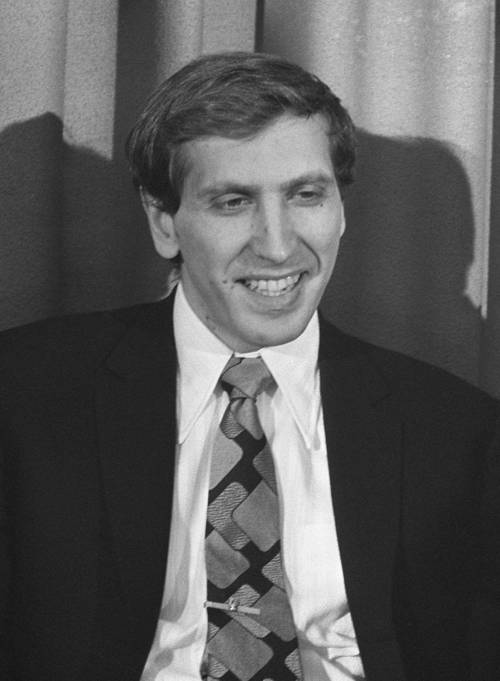
FAQ About Bobby Fischer

Who was Bobby Fischer?
Bobby Fischer was an American chess prodigy, widely considered one of the greatest chess players of all time. Born in 1943, Fischer became a grandmaster at the age of 15 and gained fame for his unique and aggressive playing style. He is best known for winning the World Chess Championship in 1972 by defeating Boris Spassky of the Soviet Union, a victory that was seen as a symbolic win during the Cold War era.

What is Bobby Fischer's significance in chess history?
Bobby Fischer is significant in chess history for several reasons. He was the first American-born player to win the World Chess Championship, and his victory in 1972 against Boris Spassky is one of the most famous matches in chess history. Fischer's style and strategic depth drastically changed chess thinking, inspiring countless players and contributing to the modern evolution of the game. His contribution to opening theory and endgame techniques are especially noted.

How did Bobby Fischer become a chess prodigy?
Bobby Fischer showcased extraordinary talent from a young age. He learned the game at the age of six and quickly progressed, winning the U.S. Chess Championship for the first time at 14. His success can be attributed to his intense dedication and study of the game, often spending hours analyzing positions and developing new strategies that were groundbreaking at the time.

What are some of Bobby Fischer's notable achievements?
Among his achievements, Bobby Fischer became a grandmaster at 15, the youngest in history at the time. He won the World Chess Championship in 1972 in a match against Boris Spassky, which is often referred to as the 'Match of the Century.' He also won the U.S. Chess Championship eight times and famously won 20 consecutive games in world-class competition, a record that stands to this day.

Why was the 1972 World Chess Championship against Boris Spassky so significant?
The 1972 World Chess Championship was significant not only for its chess content but for its geopolitical context. Held during the Cold War, the match between Bobby Fischer from the USA and Boris Spassky from the Soviet Union was seen as a confrontation between the two superpowers. Fischer's victory was celebrated in the United States as a triumph of individualism over Soviet collectivism and was a pivotal moment in bringing chess into popular culture.

How did Bobby Fischer revolutionize chess strategies?
Bobby Fischer revolutionized chess strategies through his profound understanding and original approach to the game. He extensively studied chess openings and built new variations and ideas that surprised his opponents. Fischer was also one of the first to systematically study endgames, enhancing his tactical play and positional understanding, which greatly influenced the style of play in competitive chess.

What chess openings is Bobby Fischer known for?
Bobby Fischer was known for his expertise and favored several openings, including the Ruy López, the Sicilian Defense, and the King's Indian Defense. His deep analysis and innovative approaches in these openings allowed him to gain early advantages against his opponents and set up complex, strategically rich middle game positions.

Did Bobby Fischer write any books on chess?
Yes, Bobby Fischer authored several books on chess, the most famous being 'Bobby Fischer Teaches Chess,' which is an instructional book aimed at improving fundamental chess skills through clear and simple explanations. His book, 'My 60 Memorable Games,' is a revered classic among chess players, offering insights into his playing style and thoughts behind each move.

What was Bobby Fischer's playing style?
Bobby Fischer's playing style was characterized by deep strategic planning combined with ferocious tactical precision. Fischer approached each game meticulously, often catching opponents off-guard with novel ideas and aggressive play. He was thoroughly analytical, with a remarkable ability to maintain focus and control over the board, making his playing style both exciting and intimidating.

Why did Bobby Fischer become such a controversial figure?
Bobby Fischer became controversial due to his outspoken views and unpredictable behavior. After his victory in 1972, he withdrew from competitive chess, citing disagreements with the World Chess Federation over rules and prize money. His later years were marked by erratic public statements and a reclusive lifestyle, including renouncing his American citizenship and living abroad. His behaviors and media statements often overshadowed his professional achievements.

Did Bobby Fischer ever return to competitive chess after 1972?
Bobby Fischer retired from competitive chess after refusing to defend his title in 1975 due to disputes with World Chess Federation about match conditions. However, he made a brief return to the spotlight in 1992 when he played a match against Boris Spassky in Yugoslavia, which violated U.S. sanctions and led to legal issues with the United States government.

What languages did Bobby Fischer speak?
In addition to English, Bobby Fischer was reportedly fluent in German and knew some Icelandic from his time living in Iceland later in life. His language skills were beneficial during his extensive travels across Europe and his time spent in various countries during and after his competitive chess career.

Where did Bobby Fischer live after retiring from chess?
After retiring from competitive chess, Bobby Fischer lived in several countries, including the Philippines, Hungary, Japan, and Iceland. His later years were largely spent in Iceland, where he was granted citizenship in 2005, allowing him to live there until his death in 2008.

What was Bobby Fischer's relationship with the United States?
Bobby Fischer had a strained relationship with the United States, especially during his later years. After violating U.S. sanctions by playing a match in Yugoslavia in 1992, he faced legal issues which eventually led him to renounce his citizenship. Throughout his life, Fischer often expressed critical views on U.S. policies and became increasingly reclusive from American society.

Did Bobby Fischer ever play against Garry Kasparov?
No, Bobby Fischer and Garry Kasparov never played each other. Fischer retired from competitive chess before Kasparov rose to prominence in the chess world. Although Kasparov admired Fischer’s games and contributions to chess, the two players never had the opportunity to meet across the board.

What was Bobby Fischer's impact on chess culture?
Bobby Fischer had a profound impact on chess culture by popularizing the game in the United States and worldwide. His 1972 championship win against Spassky drew unprecedented attention to chess, influencing media, film, literature, and promoting chess as a serious intellectual pursuit. Fischer inspired a generation of players and greatly boosted the game's mainstream appeal.

What are some common misconceptions about Bobby Fischer?
One common misconception about Bobby Fischer is that he was purely a tactical player; in reality, his strategic thinking was equally formidable. Another misconception is regarding his mental health; although there were rumors of mental instability, much of Fischer’s behavior was a result of his complex personality and contentious relationship with authorities, rather than diagnosed mental illness.

How did Bobby Fischer influence chess openings?
Fischer influenced chess openings by extensively studying and developing them. He often refined existing opening strategies and introduced new ideas that became widely adopted by other players. His work on the Sicilian Defense and the King's Indian is particularly noted for enhancing their strategic complexity and effectiveness.

What was Bobby Fischer's educational background?
Beyond his chess education, Bobby Fischer did not pursue formal higher education. He dedicated most of his time to studying chess, which was his primary focus throughout his life. Fischer's deep knowledge and understanding of chess were self-taught, derived from hours of practice and analysis.

How did Bobby Fischer's approach to endgame play influence modern chess?
Bobby Fischer's approach to endgame play was meticulous and innovative. He showed that strong understanding of endgames could tilt the balance in favor of a player who remains focused and strategic even late in the game. Many modern players have adopted his techniques, realizing the importance of preparation and precision in endgame scenarios, enhancing their competitive edge.
